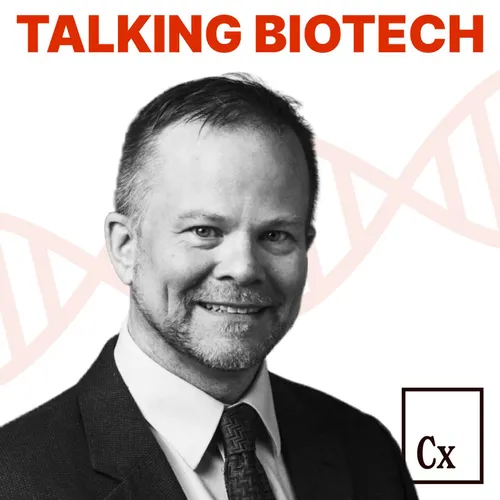
Talking Biotech with Dr. Kevin Folta
Talking Biotech is a weekly podcast that uncovers the stories, ideas and research of people at the frontier of biology and engineering.
Each episode explores how science and technology will transform agriculture, protect the environment, and feed 10 billion people by 2050.
Interviews are led by Dr. Kevin Folta, a professor of molecular biology and genomics.
- Update frequency
- every 6 days
- Average duration
- 42 minutes
- Episodes
- 468
- Years Active
- 2015 - 2025

Food Bullying
Michele Payn is a much sought after speaker, author and podcast host. She has introduced the third book in her trilogy, this one about the phenomenon of others taking issue with someone’s food choic…

CAR-T Cells: Engineered to Attack Cancer
Can we use genetic engineering to help the body’s immune system target cancer cells? This is exactly what happens with CAR-T (chimeric antigen receptor) T-cell therapy. CAR-T cells are T-cells, imm…

Impossible Burgers and Biotechnology
The Impossible Burger is meat alternative that gets its meat-like qualities from a combination of plant-based ingredients, plus “meatiness” from a biotech-derived product. There is a lot of discussio…

Edible Cotton Seed
Cotton production is massive, but mostly used for fiber. The cotton seed is a tremendous potential resource as it contains high amounts of oil and high-quality protein. However, the seeds are not di…

Farm Aid: Anti Biotech and Farmer Choice?
The Farm Babe Michelle Miller is a farmer, speaker, columnist and blogger that advocates for agricultural producers, and seeks to better connect consumers to agricultural reality. She recently atten…

Engineered Microbes to Fix Nitrogen
Nitrogen is a reality of growing plants, and must be supplied to maximize crop yields. At the same time our atmosphere is >70% nitrogen that is not usable by plants in its atmospheric form. Humans …

The Ugly Politics of Glyphosate Litigation
Dr. David Zaruk has become the foremost authority on the questionable practices within the IARC and their decision-making process. Over the last several years he has taken a key point position in in…

Mosquito Biotech Solutions – Getting the Story Straight
The tiny mosquito is a nuisance in the industrialized world, yet around the world it is a ruthless killer, spreading blood-borne diseases that bring about pain and suffering, particularly in developi…

Plagiarism and Image Manipulation in Scientific Pubilcation
Dr. Elisabeth Bik is a hero. Classically trained with plenty of lab-bench expertise, today she patrols the best scientific literature in search for plagiarism and image manipulation. Her expert eye …

An HIV Preventative in GE Rice
While HIV incidence has remained stable in the industrialized world, the virus is still transmitted in the Developing World. The development of methods of prophylaxis are critical to disease contain…

Supporting Farmer Choice in South Australia
Australia has welcomed the use of genetically engineered crops, and farmers have found particular benefit from broad acre canola and cotton cultivation. However, the benefits were not realized by som…

A Bioengineered Hangover Helper?
Genetically engineered microbes commonly manufacture our vitamins and amino acid supplements, but can they be supplements themselves? Zbiotics has developed genetically engineered bacteria that may …

Food 5.0 -How We Feed the Future
Robert Saik is an agronomist and entrepreneur with a lifetime of experience in farming. For years he has been a leading advocate for farmers, and a passionate voice promoting the newest technologie…

Gene Editing and Sickle Cell Disease
Tweet
Sickle cell disease is an inherited condition that predominantly affects people of African descent. The disease results in chronic pain and early death, and is caused by a misfolding of oxyge…

Nano Bar Codes and Product Fidelity
Products move from producer to consumer through complicated networks called supply chains. These routes of custody involve many people and organizations, and oftentimes cross international borders. …

Citrus Greening Disease Update
What is the current state of the devastating citrus greening disease, Huanglongbing (HLB). Dr. Jude Grosser from the University of Florida Citrus Research and Education Center discusses the current …

Immunotherapies Against HIV
The Human Immunodeficiency Virus (HIV) is the causal agent of the spectrum of disorders known as Acquired Immune Deficiency Syndrome (AIDS). For decades, those infected have found relief from anti-r…

Bt Brinjal in Bangladesh
Bangladesh is a population dense country with relatively little farmland. Subsistence farmers make a living by growing, harvesting and selling brinjal, or the fruit westerners know as the eggplant. …

Countering Disinformation in Africa
The African continent is emerging in many ways, yet still is developing economically. Technology is a huge part of the African transformation, yet farmers there are often forbidden to use crop techn…

Domesticating Bacteria for Industrial Production
Bacteria surround us and have specialized functions in adaptation and metabolism. Could they be helpful as micro machines that catalyze key reactions? Could teams of collaborating bacteria be comb…